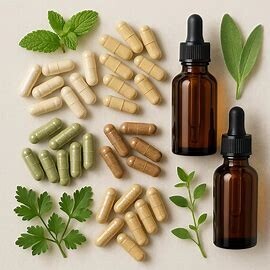Mixing herbal supplements can be a pretty common practice for people looking to boost their wellness routines. It’s tempting to combine a few different herbs, especially when each one comes with its own unique benefits. However, when it comes to safety, combining different herbal supplements isn’t always a simple add-and-go situation. Here’s what I keep in mind to make sure things stay safe and effective.

The Basics of Mixing Herbal Supplements
Herbs have been used in traditional medicine for centuries, but many folks today take them in the form of capsules, tinctures, or teas to support everything from sleep to energy. Mixing more than one herbal supplement at once is popular, but it definitely calls for some planning. Not all herbs play nicely together, and some can even work against each other or make side effects more likely.
If you’re considering taking multiple herbal supplements at once, it helps to know exactly what each herb is supposed to do, how it might interact with other herbs or prescription meds, and what risks to watch out for. Safety should always be at the top of the list, and doing a bit of homework goes a long way. You might want to jot down reasons for using each herb, so you know what you’re hoping to achieve, and can tweak your routine if one combination isn’t working well for you.
Can You Take More Than One Herbal Supplement at the Same Time?
The short answer is yes, you can take multiple herbal supplements at once; not every mix is a smart idea, though. Many people take blends like turmeric and ginger for inflammation, or combine valerian and passionflower for sleep. Some combination products you find on the shelf already bundle herbs together because they’re known to work well with each other.
But there’s a catch: taking more than one supplement at the same time can make it a lot trickier to figure out which one’s helping or causing side effects. If you’re grabbing five or more different supplements without guidance, you might end up with duplicate ingredients or interactions you don’t want. Trying to stick to a small number and tracking how you feel makes things easier and safer. I always suggest reaching out to a qualified health professional before loading up on a bunch of different products all at once.
It’s also worth mentioning that some manufacturers put together blends for you, taking the guesswork out of it. But if you’re building your own stack, take extra care to check labels for ingredient overlaps, and watch your total dosages.
Common Herb Combinations and Ones to Avoid
Some herbal supplement combos are pretty popular because of their complementary effects. For example, echinacea with goldenseal is used for immunity, while milk thistle and dandelion root are sometimes combined for liver support. When herbs have similar actions, combining them can sometimes boost the effect, but it can also double up on side effects.
- What herbs should you not mix together? Herbs that thin the blood, like ginkgo biloba and garlic, can stack up and cause bleeding risks. Stimulant herbs (such as guarana, ephedra, or yerba mate) mixed together might raise blood pressure or cause jitters. Licorice root shouldn’t be used with other herbs that affect blood pressure or potassium unless you’re being supervised.
- Mixing St. John’s Wort with other supplements or medications is known to create a lot of problems with how your body processes drugs. If you’re taking any medications, this herb is really important to avoid—unless your doctor is on board.
Not every risky combination is obvious. Doing a quick check-in with a pharmacist or herbalist is always worth it. This kind of information can help you track down the safest combinations, and help you avoid any that might clash with your medications or existing health conditions.

How Many Supplements at Once Is Too Many?
The line between “helpful” and “maybe too much” is pretty thin when mixing herbal supplements. Can you take five different supplements at once? It’s technically possible, but not often recommended without a plan. Taking several herbs that serve the same purpose (say, three or four different calming herbs) could be overkill or even bring on unexpected side effects, like drowsiness or digestive trouble.
Tracking everything you’re taking in a journal helps. Write down the names, amounts, and time of day you take them, plus any changes in how you feel. Watching for patterns can help you spot if an herb is working for you, or if something new is bringing up a problem. If you’re starting something new, adding one product at a time and waiting a week or so before introducing another gives you a much better sense of what’s actually working for you.
For some, three supplements is the upper limit to keep things organized and simple. If you’re adjusting your regimen, check in every month to see if you notice any improvements, or if you need to tweak your choices.
Risks with Mixing Herbal Supplements
Just like with prescription medications, herbal supplements can cause trouble when mixed—either with each other or with standard meds. Here are a few things to watch out for:
- Some herbs interact with blood thinners, blood pressure medications, or antidepressants. It’s especially risky if you are already on these drugs. Even common herbs like garlic or ginger, when paired with these drugs, can make side effects worse.
- Combining liver support herbs with medications that are also processed by the liver can make the effects stronger or weaker than expected. The same thing can apply to supplements like black cohosh or kava, which depend on liver enzymes for clearance.
- Taking several sedative herbs (like valerian, hops, chamomile, and passionflower) can make you more tired than planned, especially if you’re also taking sleep medications. Some people even end up with next-day grogginess.
“Natural” doesn’t automatically mean “safe.” Side effects such as headaches, nausea, or sleepiness sometimes show up when combining herbs, too. Overshooting dosages is also possible when taking multiple supplements, especially if two or three products all contain the same main ingredient. Some people also stumble upon allergic reactions more often when mixing things up.
Smart Ways to Mix Multiple Herbal Supplements Safely
A careful approach is key. Here’s a process I find helpful for keeping things safe when using more than one herbal product:
- Do Your Research: Look up trustworthy info on each herb you want to use.
- Watch for Interactions: Check for any known issues between your chosen herbs and also if you’re on prescription meds.
- Start Low, Go Slow: Begin with low doses and introduce one herb at a time, watching for any effects both good and bad.
- Give It Time: Wait at least a week before adding another herb to your routine. This way, you get a clearer idea of what’s making a difference. Rushing only increases the chance of confusion if a problem pops up.
- Use Quality Products: Stick to well known brands that are third party tested. This reduces the odds of contamination or higher-than-listed doses.
- Keep Track: Use a simple notebook or app to record supplement names and amounts, timing, and how you feel each day. This helps you make connections between what you take and changes in your body. It’s also a handy tool if you visit a healthcare provider and need to quickly explain your regimen.
- Stay Connected: Let your doctor or healthcare provider know what you’re taking; they might spot things you wouldn’t think about.
If you have a health condition, or if you’re pregnant, breastfeeding, or have allergies, always check with your doc before adding any supplements. It’s the best way to avoid hiccups that could set you back in your wellness goals.
Things to Consider Before Mixing Multiple Herbs
Beyond just safety, there are a few extra things that make a real difference when choosing and combining herbal supplements:
- Your Health Conditions: Some herbs are no-go’s if you have certain conditions, like liver or kidney issues. Checking with a professional can save you a lot of headaches down the line.
- Current Medications: Always doublecheck for possible interactions between your herbs and any prescription or over-the-counter meds you take daily.
- Dosage Concerns: Each person’s ideal dosage might be different. Combining herbs can mix up the effects, so following label instructions, and even erring on the side of caution, is smart. For example, you don’t want to accidentally take double the normal daily dose of an ingredient because it’s in two products.
- Quality of Supplements: Not all herbal products are the same. Contamination and mismarked dosages are issues in the supplement market. Look for third party testing labels such as NSF or USP to avoid these problems. Trusting well-reviewed brands is a chance to dodge unnecessary risks.
Also, check expiration dates and storage advice—herbs can lose their potency if kept in hot or humid places. Make sure everything is fresh and safely stored so you get the real benefits in your routine. Talking to a pharmacist is another way to make sure your supplements don’t clash or go stale.
FAQ: Mixing Herbal Supplements
Can you take multiple herbal supplements at once?
Yes, many people combine herbal supplements, but you’ll want to make sure their actions don’t overlap in unsafe ways or interact with medications you’re already using.
What herbs should you not mix together?
Herbs that thin the blood (like ginkgo, garlic, and ginseng) should be avoided together or with prescription blood thinners. Stimulant herbs mixed together can mildly to seriously impact blood pressure or heart health. St. John’s Wort interacts with many medications and isn’t recommended to mix without medical supervision.
Can I take 5 different supplements at once?
You technically can, but it increases your risk of side effects, duplicate dosing, and tricky interactions. If you’re set on taking multiple supplements, add one at a time, space out your introduction of each, and keep careful notes on any changes in how you feel.
Are there any supplements you shouldn’t mix?
Some supplements shouldn’t be mixed due to safety or effectiveness. Always be careful with blood thinners, sedatives, or anything processed by the liver. Combine one or two at a time under professional guidance and avoid doubling up on products with the same main ingredient.
Final Thoughts on Combining Herbal Supplements
Combining herbal supplements can really give a boost to your wellness routine if you approach it thoughtfully. Taking a slow, informed approach and checking in with experts keeps you in the safe zone. Quality, careful tracking, and attention to your body’s signals all help you get the benefits while dodging unwanted issues.
Keep in mind that individual responses can really vary. A little planning upfront makes your herbal adventure much smoother, and much safer. Remember, every journey with herbs is unique, so finding what works best for you may take a bit of experimenting, note-taking, and asking for advice now and then. Safety first and you’ll get to enjoy the perks of a well-rounded herbal approach.


This was such a helpful breakdown of safe vs. risky combos. One thing I’ve always wondered—when you’re tracking supplements in a journal, how do you know if it’s the herb itself that’s working or just the placebo effect? Do you find it’s better to track specific symptoms (like sleep quality, digestion, or energy levels) rather than general feelings? I think a lot of people would benefit from hearing more about how to separate “real results” from “wishful thinking.”
Hi Kris!
Great questions!
A few tips I’d give you for determining whether the effects of an herbal supplement are real or just psychological (placebo) are:
-Have a good baseline of what ‘normal’ looks like for you. Try journaling for a few days or a week before starting a new supplement so you have a good gauge to base your changes off of.
-Take note of how quickly or slowly the effects of the supplement come on. True results will take more time and come with consistent use of the herb, whereas placebo effects will likely come on quickly and may even come and go.
-You could even do a controlled blind test for yourself and have someone give you the supplements without telling you which is real and which is a placebo.
You can absolutely track your emotions or feelings as well as the more ‘physical’ effects of an herb. This can give you valuable feedback as well. I would just label the feelings separately in your journal, so you can distinguish them from other effects or symptoms.
Hope this helps and don’t hesitate to reach out with any other questions you may have!